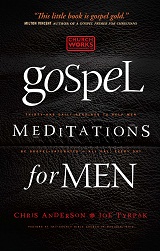"My Daddy's Name is Donor"
http://familyscholars.org/my-daddys-name-is-donor-2/ My Daddy’s Name is Donor: A New Study of Young Adults Conceived through Sperm Donation
A Report Released Internationally by the Commission on Parenthood’s Future
Elizabeth Marquardt, Norval D. Glenn, and Karen Clark, Co-Investigators

 The following is an excerpt from a series of essays entitled “Towards Conservative Christian Church” (parts 17 and 18). The series continues at
The following is an excerpt from a series of essays entitled “Towards Conservative Christian Church” (parts 17 and 18). The series continues at  Gospel Meditations for Men is a book published recently by ChurchWorks Media and authored by Chris Anderson and Joe Tyrpak. Copies are available at
Gospel Meditations for Men is a book published recently by ChurchWorks Media and authored by Chris Anderson and Joe Tyrpak. Copies are available at
Discussion